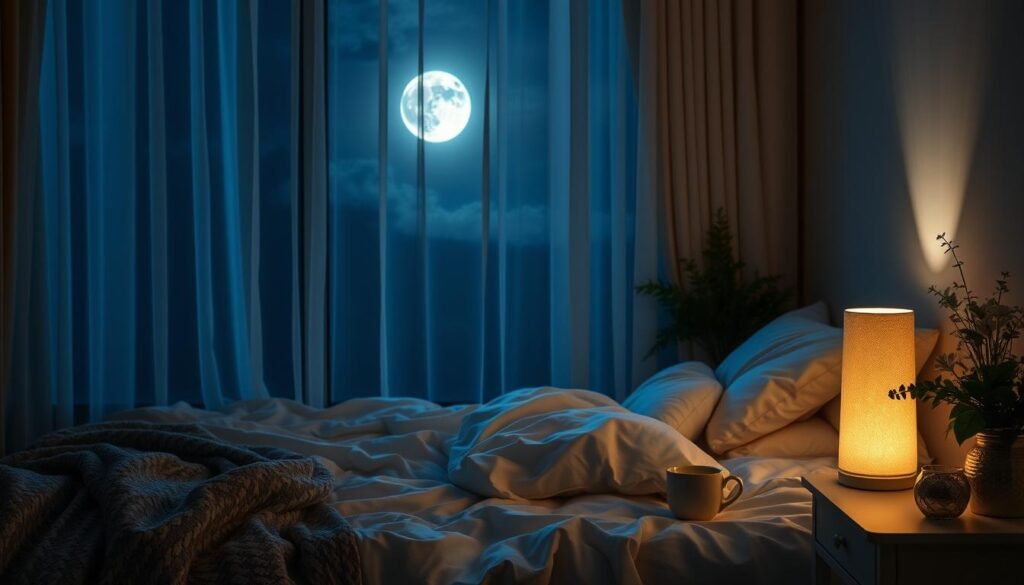Did you know about 30 to 40% of U.S. adults have insomnia each year? Also, around 18% deal with anxiety disorders. Finding the *best antidepressant for sleep and anxiety* is crucial for mental health. This guide will look at how these issues affect life.
Together, sleep problems and mental health challenges can change how *mental health medications* work. So, it’s important to know which treatments are best.
We’ll discuss different antidepressants, lifestyle changes, and natural solutions for sleep and anxiety problems. It’s key to understand how sleep disorders and anxiety connect. This knowledge helps in finding the best treatment, leading to better health.
Key Takeaways
- 30-40% of adults in the U.S. face insomnia annually.
- 18% of Americans are affected by anxiety disorders every year.
- The combination of sleep issues and anxiety can severely impact mental well-being.
- Choosing the right antidepressant is crucial for managing related symptoms effectively.
- Understanding the links between sleep and anxiety paves the way for better treatment options.
Understanding Sleep and Anxiety Disorders
Anxiety disorders lead to constant worry and unease. They cause both mental and physical problems. Over 20% of adults in the US have an anxiety disorder. This is a big part of mental health issues.
Insomnia is a common sleep disorder affecting those with anxiety. About one-third of adults don’t get enough sleep. Not sleeping enough makes anxiety symptoms worse. Sleep issues are also signs of anxiety disorders like GAD and PTSD.
Doctors use many ways to help people with these problems. They might suggest lifestyle changes or therapy at first. Medicines like trazodone and therapies like CBT are also helpful.
There’s a two-way link between sleep and anxiety. Lack of sleep can increase anxiety, and more anxiety can make sleeping hard. Knowing about this link is key. It shows the importance of treatments that help both issues.
The Connection Between Sleep and Mental Health
The connection between sleep and mental health is deep. Poor sleep makes mental health issues worse. Mental health disorders often cause sleep problems. Symptoms like trouble focusing and irritability come from insomnia. They can increase anxiety feelings.
Many people have both anxiety and sleep problems. For instance, 60-90% of those with major depression also have insomnia. Anxiety disorders lead to worsening sleep over time. This harms one’s emotional state. Seeing sleepless nights as signs of mental health issues is key.
Fixing sleep problems helps improve mental health and lowers anxiety. Help can come from regular sleep times and relaxation practices. These steps can make sleep better and stabilize mental health.
Addressing both sleep and mental health may involve therapy and medication. Doctors often suggest antidepressants for those dealing with insomnia and mood issues. Better sleep hygiene can lower anxiety and boost mental strength.
| Sleep Issues | Mental Health Effects |
|---|---|
| Insomnia | Increased anxiety and depression levels |
| Hypersomnia | Potential sign of clinical depression |
| Poor Sleep Quality | Difficulty in concentration and irritability |
| Midnocturnal Insomnia | Common residual symptom of depression |
Knowing the close link between sleep and mental health helps. It leads to taking steps for better sleep habits. This improves mental health.
Signs and Symptoms of Sleep Disorders
Sleep disorders can deeply affect your day-to-day life. It’s key to spot their signs and symptoms. Some symptoms of sleep disorders you might notice include:
- Difficulty falling or staying asleep
- Excessive daytime sleepiness
- Irritability and mood swings
- Cognitive dysfunction, including memory problems
Insomnia is a common sleep issue, hitting about 10% of adults all the time. About 30% to 40% face it sometimes. Knowing these signs is crucial because they affect sleep quality and mental well-being. When people don’t sleep well, keeping up with daily tasks and relationships gets hard.
Not sleeping enough can also make anxiety and depression worse. Disorders like Restless Legs Syndrome (RLS) and messed-up sleep cycles add to these troubles. This starts a tough cycle of not sleeping well and feeling stressed.
Understanding these signs helps people look for help early. Knowing the symptoms of sleep disorders means you can get therapy or medicine. This is an important step toward getting better.
| Symptoms | Possible Impact |
|---|---|
| Difficulty falling asleep | Increased night-time anxiety |
| Excessive daytime sleepiness | Reduced alertness and productivity |
| Irritability | Strained relationships |
| Cognitive dysfunction | Poor decision-making abilities |
Recognizing these issues is not just about treating sleep disorders. It’s also about boosting sleep quality, mental health, and life happiness.
Common Types of Antidepressants
It’s key to know the types of antidepressants for treating depression well. Classes are divided by how they work. The most used are Selective Serotonin Reuptake Inhibitors (SSRIs). Medications like fluoxetine (Prozac), sertraline (Zoloft), and citalopram (Cipramil) fall under SSRIs. They are popular because they have fewer side effects. They also help a lot with depression and anxiety.
Serotonin-Norepinephrine Reuptake Inhibitors (SNRIs) are another important group. This includes duloxetine (Cymbalta) and venlafaxine (Effexor). These mental health medications level out serotonin and norepinephrine. They often help with anxiety and chronic pain.
Tricyclic antidepressants (TCAs), like amitriptyline and nortriptyline, were used more in the past. Today, they’re less common but still helpful for chronic nerve pain. There’s Noradrenaline and Specific Serotonergic Antidepressants (NASSAs), too. Mirtazapine (Zispin) is one of them. Its sedative effect is good for those with sleep issues.
Serotonin antagonists and reuptake inhibitors (SARIs) include trazodone (Molipaxin). They work well for depression and help improve sleep. Monoamine oxidase inhibitors (MAOIs) are not often used anymore. They can have severe side effects and require diet changes.
Each antidepressant category meets a different need. This allows for tailored therapy options. For more info on these mental health medications, see resources like this guide.
How Antidepressants Affect Sleep Quality
Antidepressants impact sleep quality in different ways. They might make sleep better or worse. Since there are around two dozen options for treating depression, it’s key for those dealing with insomnia and mood issues to know how these drugs affect sleep.
Sedating antidepressants, like tricyclic antidepressants (TCAs) including amitriptyline and doxepin, can make you sleepy. They work by promoting drowsiness, making it easier to fall asleep. But, SSRIs and certain SNRIs, such as fluoxetine and venlafaxine, often lead to longer sleep onset and less efficient sleep, causing disturbances.
It’s important to note that many antidepressants reduce REM sleep. This reduction can trigger concentration and memory problems, and lower creativity. Yet, some drugs, like nefazodone, don’t affect REM sleep and maintain sleep well. Mirtazapine and trazodone, on the other hand, improve sleep quality and tackle depression effectively.
Matching the right insomnia treatment with the appropriate antidepressant is key. For instance, TCAs like amitriptyline are good at targeting early sleep stages. Mirtazapine works well to enhance sleep quality without making you too drowsy during the day.
Gently adjusting antidepressant doses with a doctor’s help can ease withdrawal and sleep issues. This approach is better than stopping suddenly. It helps keep sleep quality stable during the change.
Choosing the right antidepressant matters a lot. Talking with a healthcare provider can shape a treatment plan focused on mental health and good sleep. For more info on choosing the right medication for anxiety and depression, see this comprehensive guide.
Best Antidepressant for Sleep and Anxiety
Many people struggle with both sleep problems and anxiety. They search for good treatments. Sedating antidepressants are popular because they help with sleep and calm anxiety. Finding the right one can greatly improve life by easing these issues.
Overview of Sedating Antidepressants
Sedating antidepressants are key for treating insomnia and anxiety. They improve sleep and reduce anxiety. Most are meant for depression but also make you sleepy, helping those with sleep and anxiety needs.
Specific Medications: Mirtazapine and Trazodone
Two important medicines are mirtazapine and trazodone.
Mirtazapine helps with anxiety, sleep, and depression. It starts at 15 mg a day for anxiety, up to 45 mg. For sleep, a tiny 7.5 mg dose might work. It could take 2 to 3 months to help with anxiety or depression. Side effects like feeling sleepy, dry mouth, and wanting to eat more can happen. It’s rare, but some might face serious issues like pancreatitis or low sodium. Be careful if allergic to mirtazapine or if taking MAO inhibitors.
Trazodone stands out for making people sleepy, mainly for insomnia. It can make sleep better when compared to a placebo. Yet, users should know about morning tiredness and dry mouth. Its effectiveness might drop over time. This means talking regularly with doctors is vital. It ensures the advantages outweigh potential risks.

| Medication | Typical Starting Dose | Common Side Effects | Considerations |
|---|---|---|---|
| Mirtazapine | 15 mg (max 45 mg) | Drowsiness, dry mouth, weight gain | Off-label for anxiety; takes 8-12 weeks for effects |
| Trazodone | Typically 50 mg | Morning grogginess, dry mouth | Monitor for efficacy; potential decreased effect over time |
Finding the best medication is crucial for those handling sleep and anxiety issues. Knowing mirtazapine and trazodone’s ups and downs helps patients talk wisely with doctors. They can choose the best treatment together.
Antidepressants for Anxiety Disorders
Antidepressants are key for treating anxiety disorders. They are especially important for people with Generalized Anxiety Disorder (GAD). About 3.1% of Americans face GAD each year. SSRIs like Citalopram, Escitalopram, Fluoxetine, Paroxetine, and Sertraline are effective for easing anxiety. They are often the first choice.
SSRIs help reduce symptoms like excessive worry. They start working after a few weeks, so doses usually increase slowly over 4-8 weeks. Sometimes, adding Duloxetine or Venlafaxine can help more, as they treat depression and anxiety.
While SSRIs are widely used, there are other options. Mirtazapine and Trazodone can help with anxiety and sleep. But, drugs like Alprazolam and Lorazepam provide quick relief for panic. They should be used with care due to addiction risks. Beta-blockers, such as propranolol, are good for physical anxiety symptoms without causing drowsiness.
Every person reacts differently to treatment, so it’s crucial to customize the approach. Medicines work well with therapies like cognitive-behavioral therapy (CBT) and mindfulness. Using these treatments together often leads to better results for those struggling with anxiety disorders.
How to Choose the Right Antidepressant
Finding the right antidepressant can feel overwhelming because there are so many options. It’s important to consider your symptoms, the antidepressant side effects, and how the medicine works with others you’re taking. Knowing all this helps you make a good choice for your mental health treatment.
Considerations for Efficacy and Side Effects
To choose well, you need to think about different factors:
- Effectiveness and Tolerability: Certain antidepressants work better for specific types of depression. SSRIs, for example, are often good for anxiety.
- Side Effects: Knowing the possible side effects is important. SSRIs can cause weight gain and tiredness, while SNRIs might affect sexual health.
- Patient Safety: It’s key to consider any drug interactions and personal health issues, especially for those with ongoing medical conditions.
- Personal Preference: Talking about past antidepressant use can influence the choice. A drug that helped a family member might also help you.
You should talk openly with your healthcare provider about what you prefer and worry about. This helps you explore treatment options better. For more information on choosing medicine, you might find this article on common medications for anxiety and depression helpful.

Natural Remedies for Anxiety and Insomnia
Many people turn to natural remedies for anxiety and insomnia to find peace. They use herbal supplements, make life changes, and try mindfulness. These can help with anxiety and sleep problems.
Herbs like valerian root, chamomile, and passionflower are popular for sleep. A study in 2016 showed chamomile could reduce anxiety over 12 weeks. Also, ashwagandha can lower stress if you take 600mg daily.
Exercise is a powerful alternative treatment. A 2015 study found that 150 minutes of exercise weekly cuts down insomnia and anxiety.
Meditation helps too. A 2011 study showed improvements in sleep quality and duration for those who meditated.
While herbs help, safety concerns like contamination exist. Talking with a doctor about natural remedies for anxiety and insomnia is wise. This way, you can mix these methods with standard treatments safely.
Alternative Treatments and Lifestyle Changes
Addressing mental health challenges often involves many methods. Besides traditional medications, alternative treatments for depression can be helpful. Making lifestyle changes for mental health boosts overall well-being. These steps can greatly lower anxiety and insomnia.
One lifestyle change is getting regular physical activity. Just five minutes of aerobic exercise starts to reduce anxiety. The Physical Activity Guidelines for Americans recommend consistent exercise. This helps fight anxiety and improve mood.
Nutrition is also key to mental health. Eating foods rich in Omega-3s, B vitamins, vitamin C, magnesium, and zinc can decrease anxiety. A healthy diet is a cornerstone of overall health.
Poor sleep can make anxiety worse, so sleep hygiene is important. Establishing a regular sleep schedule and a calming bedtime routine can enhance sleep quality. Techniques like cognitive behavioral therapy (CBT) and meditation help manage anxiety and sleep.
Yoga and relaxation methods are effective in easing anxiety symptoms. Massage therapy is another helpful treatment for those with generalized anxiety disorder. It offers a calming experience that aids relaxation.
Considering natural supplements like valerian root, magnesium, and lavender might help with mood and sleep. However, it’s smart to talk to a healthcare provider before adding these supplements to your routine.
| Alternative Treatments | Benefits |
|---|---|
| Cognitive Behavioral Therapy (CBT) | Improves sleep and reduces anxiety symptoms. |
| Yoga | Enhances relaxation and lowers stress levels. |
| Regular Exercise | Reduces anxiety while improving mood and sleep quality. |
| Massage Therapy | Proven effective for generalized anxiety disorder. |
| Natural Supplements | Potential mood enhancement and sleep support. |

Adding these alternative treatments and lifestyle adjustments to everyday life can improve anxiety and depression management. This leads to better mental health and life quality.
Consulting a Healthcare Provider
When you think about treating anxiety and insomnia, talking to a healthcare provider is key. They provide specialized support for your mental health needs. These experts help choose the right meds and consider any other health issues you might have.
Talking often with your healthcare provider makes medication advice work better. Regular checks help track progress and spot any side effects. They can change your treatment based on how you’re doing. This helps you find the best way to feel better. You can explore many treatments, including meds and other methods, for a full approach to your mental health.
Anxiety disorders are common, affecting many people. About 10.3% of folks deal with them in a year. Those with panic disorder or generalized anxiety disorder really benefit from expert tips on handling their condition. Experts can offer valuable advice, leading to better health plans.
For extra information on medication and treatment options, you can check out this resource.
Conclusion
Understanding how to deal with anxiety and sleep problems is key for good mental health. It starts with knowing the effective treatments. Recognizing the best antidepressants for sleep and anxiety is important. So is adding natural remedies and lifestyle changes to improve life quality.
There’s been an increase in medicine use, especially with teens during tough times like the COVID-19 pandemic. It shows we need strong mental health plans. Medicines like fluoxetine and sertraline are common starting points. But adding therapy, like cognitive behavioral therapy, may give better results. The aim is a custom plan for each person, using a mix of medical, behavioral, and lifestyle changes.
Talking to healthcare pros is crucial to get a personal treatment plan. Knowing all about anxiety and sleep issues helps people find the best care. This means looking at a whole-person approach to get and stay well mentally. For more tips on noticing early anxiety signs, check out this article on warning signals of a bigger problem.